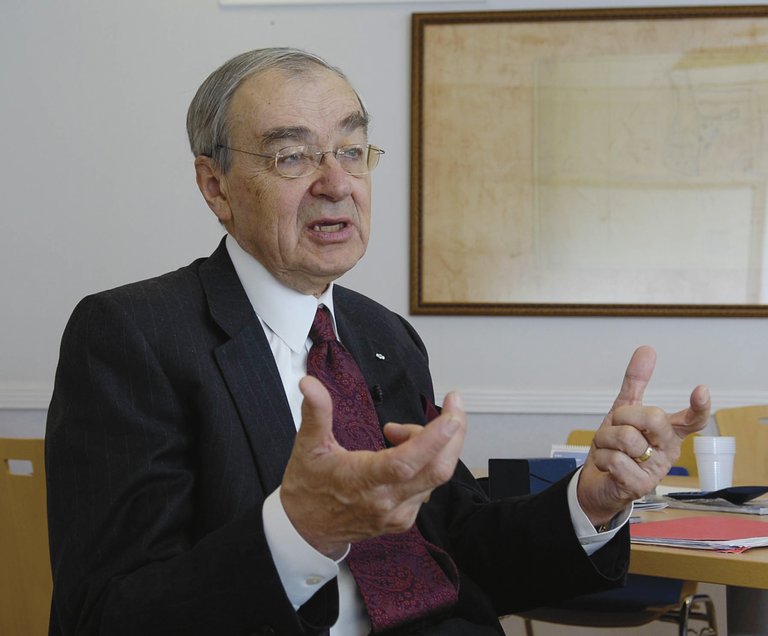"We must not lose hope, even if it is Alzheimer's"

No, of course. Not much less.
It is an investigation of diseases of the brain from the point of view of treatment and prevention. In fact I am a doctor and I seek to cure and prevent. Knowledge is necessary, of course, but my main goal is to prevent and delay neurological diseases.
I think the evidence is now total. They really give themselves at once, at least at a time. And in some patients they converge and cause a mixed disease, much harder than pure vascular pathology or pure alzheimer's disease. The combination is bad.
Age is a risk factor that is given at different ages depending on the genes and other risk factors. Yes, the older it is, the greater the probability of developing the disease.
The most important thing is to know the risk factor before arriving at the hospital. It depends on each person: you have to know if you have history of hypertension or alzheimer's disease and then go to the general practitioner. He can do some preliminary tests and, if he sees any problem, he will send it to the neurologist.
But I think it is not practical to go directly to the hospital. We do not have enough professionals for it. And besides it is not necessary.

However, it is necessary to change life in cities because it is not healthy (I'm talking about North America, I can't talk about Europe). There is no room to exercise, meals are cheap and with lots of fat, with lots of salt, with lots of calories. That is why I think that in the commercial aspect we should put our hand, tax fatty foods and subsidize healthy foods like fruit, cereals, vegetables... Prevention should be done at many levels.
We would have to think more broadly: it is necessary to facilitate healthy life so that the mind is also healthy.
There is a very simple test that is done in five minutes: it is an analysis of the executive function. This function is disturbed in the cognitive alterations of the vascular base. Difficulty planning, solving problems, focusing topics. However, in Alzheimer's disease the alteration refers to memory.
The answer is negative. There is no way to be completely safe. At present all in vivo diagnoses are provisional. And after death nothing is clear, sometimes Alzheimer's is seen in people without cognitive alterations.
In an investigation conducted in the United States with nuns, only 57% of those diagnosed with Alzheimer's disease after their death had cognitive impairments. This means that in all cases the diagnosis is provisional, with greater or lesser probability, but there is no total certainty.
The most important thing is to identify vascular factor, that is, stroke or other risk factors: hypertension, sedentarism, high level of lipids, smoking...
Well I do not know if it is a disease. It is a syndrome. And we still do not know if it has a specific cause or if it is due to several pathological processes. I suspect that Alzheimer's is not a single disease, but several diseases. It is the only completely pure variant of Alzheimer's disease, which appears very early within a family, that is, it is inherited from generation to generation. This is an alzheimer caused by genetic alterations. But this is an exception, only 2% of cases. Most of the population suffers from vascular pathology and alzheimer's disease.

Well, keep in mind that the woman lives on average seven more years. Therefore, at a higher age, higher risk. You're right from a statistical point of view, but I don't know how much that can be explained with women living longer.
I think the most important treatment is prevention. And I think what you have to do is the treatment of risk factors, the treatment of stroke. That is demonstrated. And it gives us hope: it is not possible to prevent Alzheimer's disease, but it does go back.
As for treatment, there is currently no effective treatment. The treatment is symptomatic. I know that in the next two or three years there will be no significant advances in the paralysis, a very complex process. In addition, in the phase we treat we just have to do, since the brain is already deteriorated. Therefore, we must prevent it in time and do what is in our hands: treat vascular risks and prevent stroke.
First, I would tell you that no one can assure you that you have Alzheimer's. And secondly, I would tell you that, despite the disease, prevention has a place, for example, if you have risk factors you have to treat them to not have a cerebral infarction. In addition, you can perform physical and mental exercises, use music, participate in social activities... This will protect the brain.
Therefore, although the disease does not stop, at least it can be delayed and have a good quality of life. It is important to be optimistic. We should not lose hope, even with Alzheimer's.
Let me know, no. Not in the coming years. But I think it's realistic to think that you can go back a lot and that maybe a total prevention is achieved. That is to be realistic.

Buletina
Bidali zure helbide elektronikoa eta jaso asteroko buletina zure sarrera-ontzian











